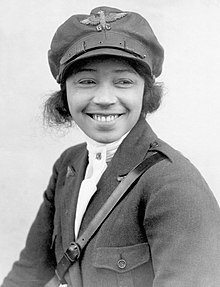Aviation
Jump to navigation
Jump to search



Aviation refers to flying using aircraft, machines designed by humans for atmospheric flight. More generally, the term also describes the activities, industries, and regulatory bodies associated with aircraft.
Quotes[edit]
- Pilots take no special joy in walking: pilots like flying. Pilots generally take pride in a good landing, not in getting out of the vehicle.
- Neil Armstrong, On his famous moonwalk, as quoted in In the Shadow of the Moon : A Challenging Journey to Tranquility, 1965-1969 (2007) by Francis French and Colin Burgess
- The air is the only place free from prejudices. I knew we had no aviators, neither men nor women, and I knew the Race needed to be represented along this most important line, so I thought it my duty to risk my life to learn aviation and to encourage flying among men and women of our Race who are so far behind the White race in this modern study.
- Bessie Coleman as quoted on Blackhistorypages.net
- Ours is the commencement of a flying age, and I am happy to have popped into existence at a period so interesting.
- Amelia Earhart, 20 Hrs 40 Mins (1928)
- Fleets are not confined to the ocean, but now sail over the land. … All the power of the British Navy has not been able to prevent Zeppelins from reaching England and attacking London, the very heart of the British Empire. Navies do not protect against aerial attack. … Heavier-than-air flying machines of the aeroplane type have crossed right over the heads of armies, of million of men, armed with the most modern weapons of destruction, and have raided places in the rear. Armies do not protect against aerial war.
- Alexander Graham Bell in "Preparedness for Aerial Defense", Addresses Before the Eleventh Annual Convention of the Navy League of the United States, Washington, D.C., April 10-13, 1916 (1916), 70.
- Oh! I have slipped the surly bonds of Earth
And danced the skies on laughter-silvered wings;
Sunward I've climbed, and joined the tumbling mirth
of sun-split clouds,—and done a hundred things
You have not dreamed of—wheeled and soared and swung
High in the sunlit silence. Hov'ring there,
I've chased the shouting wind along, and flung
My eager craft through footless halls of air….
Up, up the long, delirious, burning blue
I've topped the wind-swept heights with easy grace
Where never lark nor ever eagle flew—
And, while with silent lifting mind I've trod
The high untrespassed sanctity of space,
Put out my hand, and touched the face of God.- John Gillespie Magee, Jr., "High Flight" (September 3, 1941); reported in Respectfully Quoted: A Dictionary of Quotations (1989). Ronald Reagan quoted from the first and last lines in a televised address to the nation after the space shuttle Challenger exploded, January 28, 1986. Weekly Compilation of Presidential Documents (February 3, 1986), p. 105.
Attributed[edit]
- The saying ‘Getting there is half the fun’ became obsolete with the advent of commercial airlines.
- Henry J. Tillman, as quoted in Strange but True (February 9, 2011) by Samantha Weaver, The Mountain Eagle (newspaper)
- “No airship will ever fly from New York to Paris. That seems to me to be impossible. What limits the flight is the motor. No known motor can run at the requisite speed for four days without stopping, and you can’t be sure of finding the proper winds for soaring. The airship will always be a special messenger, never a load-carrier. But the history of civilization has usually shown that every new invention has brought in its train new needs it can satisfy, and so what the airship will eventually be used for is probably what we can least predict at the present.”
- Wilbur Wright in the Cairo, Illinois, Bulletin, March 25, 1909, according to the Smithsonian (often misquoted, as detailed here, and also misattributed to his brother, Orville Wright)

